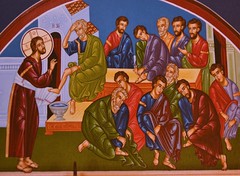[ad_1]

For the kingdom of God is not in word but in power. (1 Corinthians 4:20)
When the devil offered Christ all the kingdoms of the world (Matthew 4:8), Christ rebuked him and refused the offer. Whatever power and glory Jesus has does not stem from worldly kingdoms or secular empires. Christ walks away from any effort to make Him a worldly king (John 6:15). Christ sought neither applause nor approval from the devil or from humans. He came to go the way of the cross in order to establish God’s love in the hearts of all people. He reveals the power of love to defeat even death.

St Gregory the Great says:
Hence, the Mediator between God and humanity, who transcends the knowledge and understanding of heavenly spirits, and who reigns in heaven before the beginning of time, even he shunned to take an earthly Kingdom. Thus it is written: ‘Jesus, therefore, when he knew that they would come to seize him and make him a king, fled again into the mountains by himself‘ (John 6:15). Who, indeed, would have been able to govern so perfectly, but he who would have reigned over subjects that he himself created? But he appeared in the flesh not only to redeem us through the passion, but also to teach us through conversation, offering himself as an example to those who follow him. He did not wish to become a king; instead, he went freely to the cross. He fled the glory of exaltation offered to him. He chose instead the penalty of a shameful death so that his [followers] might also learn to flee the applause of the world, to fear not its terrors, to value adversity for the sake of truth, and to decline prosperity fearfully. (THE BOOK OF PASTORAL RULE, p 33)

Christ came to serve humanity and defeat death. Those who accept positions of leadership in the Church are supposed to imitate Christ in being people of love and willing to take up the cross to follow Christ and imitate his self-denial and humility. Those who abuse clerical power in the Church or who abuse any member of their flock reject Christ and follow the devil. Again, St Gregory the Great says:
No one does more harm in the Church than he who has the title or rank of holiness and acts perversely. This is because no layperson presumes to refute the delinquent. Moreover, because such a sinner is honored by the dignity of his rank, his offenses spread considerably by way of example. And yet everyone who is unworthy would flee from such a great burden of guilt if, with the attentive ear of the heart, he pondered the saying of the Truth: ‘He that scandalizes one of these little ones who believes in me, it would be better for him that a millstone was hung around his neck and that he was cast into the depths of the sea‘ (Matthew 18:6). . . .

Whoever, therefore, gives off the appearance of sanctity, but destroys another by his words or example, it would be better for him that his earthly acts, demonstrated by worldly habits, would bind him to death, than for his sacred office to be a source for the imitation of vice in another. Indeed, his punishment in hell would be less terrible if he fell alone. (THE BOOK OF PASTORAL RULE, p 32)
Power in the Church is manifested in those who truly serve others to bring them to salvation, rather than despotically lording over them.

But Jesus called them to him and said, “You know that the rulers of the Gentiles lord it over them, and their great men exercise authority over them. It shall not be so among you; but whoever would be great among you must be your servant, and whoever would be first among you must be your slave; even as the Son of man came not to be served but to serve, and to give his life as a ransom for many.” (Matthew 20:25-28)
[ad_2]
Source link

